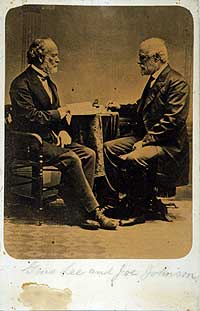 When it comes to the Civil War, everyone loves to think and talk about causation. Was slavery the cause of the Civil War? Why did the Confederacy lose the War (or why did the Union win it, which may be a slightly different question)? Even questions such as “Was Joe Johnston a good general?” can be thought of as causation-related (“Was Joe Johnston’s poor generalship, rather than Sherman’s superior numbers and resources, or other factors, the cause of the loss of Atlanta?”).
When it comes to the Civil War, everyone loves to think and talk about causation. Was slavery the cause of the Civil War? Why did the Confederacy lose the War (or why did the Union win it, which may be a slightly different question)? Even questions such as “Was Joe Johnston a good general?” can be thought of as causation-related (“Was Joe Johnston’s poor generalship, rather than Sherman’s superior numbers and resources, or other factors, the cause of the loss of Atlanta?”).For all those who like to talk about causation, I highly recommend Lawrence Solum’s recent post over at the Legal Theory Blog entitled “Legal Theory Lexicon: Causation.” Although, as the title implies, it includes discussion of legal causation, it provides an excellent primer of general causation concepts and issues such as necessary (“but-for”) and sufficient causes, overdetermination and others.
It also highlights a point that I think many people often overlook: most everyday discussions of causation are really discussions about necessary and sufficient causation; and “[b]oth necessary and sufficient causation are counterfactual concepts.” “Every statement regarding a necessary or sufficient cause can be interpreted as making a counterfactual (‘what if’) claim.”
I think the single biggest difficulty that people encounter when discussing historical causation is the assumption that, if you search hard enough, it will be possible to identify “the cause” of an event, when in fact there are probably many causes. But running a close second, I suspect, is the counterfactual nature of causation thinking. If I believe (as I do) that slavery was a necessary (but-for) cause of secession, I am really saying that secession would not have occurred if slavery had not existed. But putting aside that it’s technically impossible to test that hypothesis (since it’s counterfactual and never happened), it’s virtually impossible for me even to imagine the antebellum south without slavery. It’s hard to conduct a thought experiment that you can’t think of.
No comments:
Post a Comment